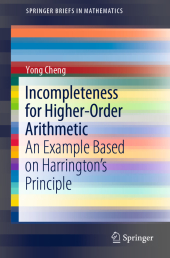 Neuerscheinungen 2019Stand: 2020-02-01 |
Schnellsuche
ISBN/Stichwort/Autor
|
Herderstraße 10
10625 Berlin
Tel.: 030 315 714 16
Fax 030 315 714 14
info@buchspektrum.de |

Yong Cheng
Incompleteness for Higher-Order Arithmetic
An Example Based on Harringtonīs Principle
1st ed. 2019. 2019. xiv, 122 S. 1 SW-Abb. 235 mm
Verlag/Jahr: SPRINGER, BERLIN; SPRINGER SINGAPORE; SPRINGER 2019
ISBN: 9811399484 (9811399484)
Neue ISBN: 978-9811399480 (9789811399480)
Preis und Lieferzeit: Bitte klicken
Gödelīs true-but-unprovable sentence from the first incompleteness theorem is purely logical in nature, i.e. not mathematically natural or interesting. An interesting problem is to find mathematically natural and interesting statements that are similarly unprovable. A lot of research has since been done in this direction, most notably by Harvey Friedman. A lot of examples of concrete incompleteness with real mathematical content have been found to date. This brief contributes to Harvey Friedmanīs research program on concrete incompleteness for higher-order arithmetic and gives a specific example of concrete mathematical theorems which is expressible in second-order arithmetic but the minimal system in higher-order arithmetic to prove it is fourth-order arithmetic.
This book first examines the following foundational question: are all theorems in classic mathematics expressible in second-order arithmetic provable in second-order arithmetic? The author gives a counterexample for this question and isolates this counterexample from the Martin-Harrington Theorem in set theory. It shows that the statement "Harringtonīs principle implies zero sharp" is not provable in second-order arithmetic. This book further examines what is the minimal system in higher-order arithmetic to prove the theorem "Harringtonīs principle implies zero sharp" and shows that it is neither provable in second-order arithmetic or third-order arithmetic, but provable in fourth-order arithmetic. The book also examines the large cardinal strength of Harringtonīs principle and its strengthening over second-order arithmetic and third-order arithmetic.


